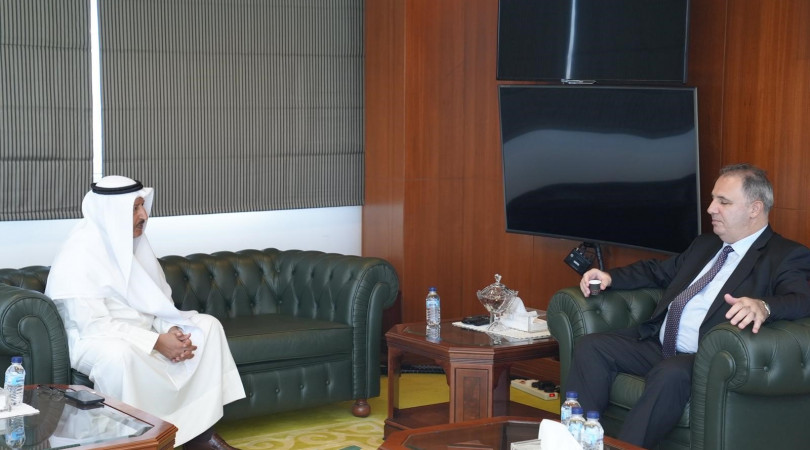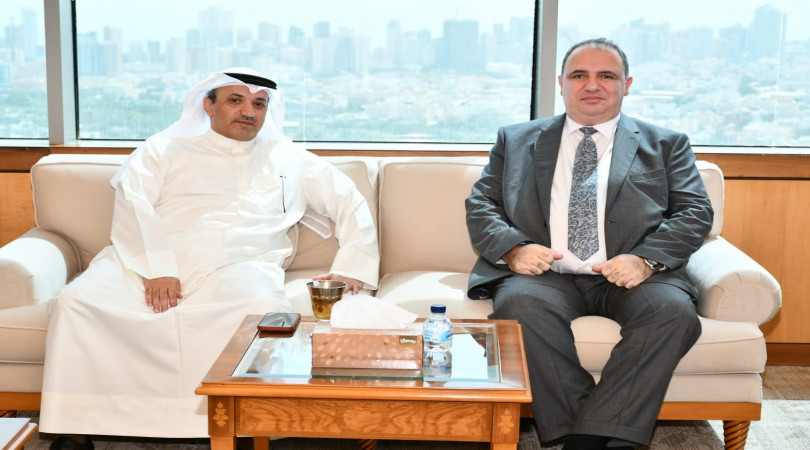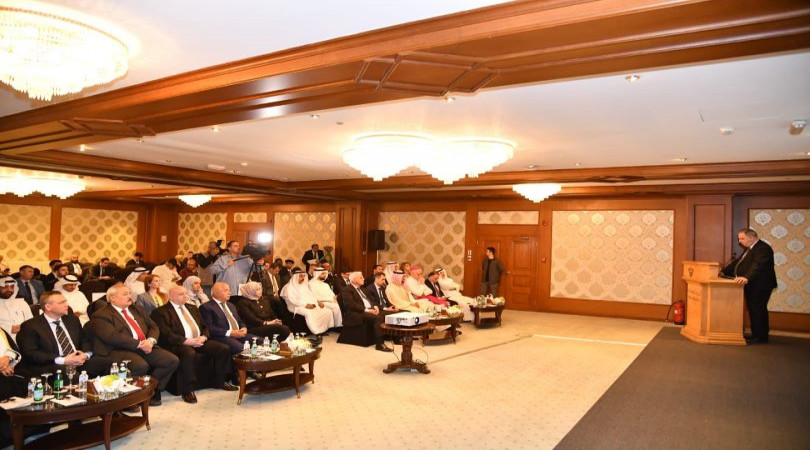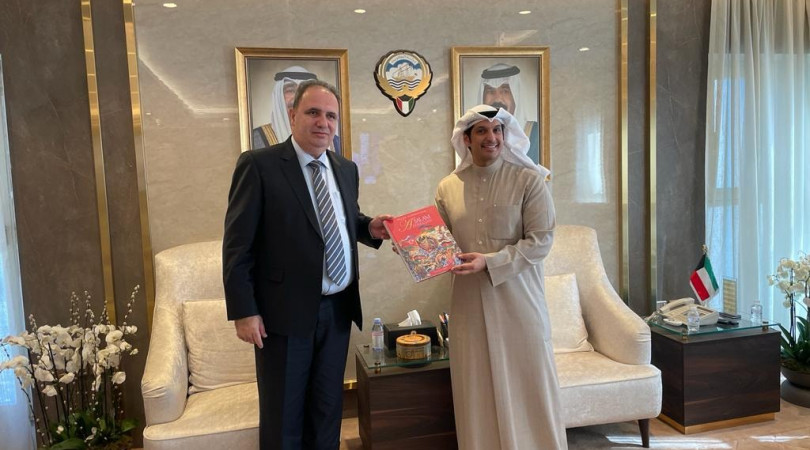Ambassador of the Republic of Azerbaijan to the State of Kuwait H.E Elkhan Gahraman talked about Armenia-Azerbaijan, Nagorno-Karabakh conflict in his interview to "TimesKuwait" newspaper
As Azerbaijan celebrates its 29th anniversary of Independence on 18 October, The Times Kuwait spoke with the country’s ambassador H.E. Elkhan Gahraman, on a variety of issues to mark the occasion.
This year Azerbaijan celebrates the 29th anniversary of its independence, Your Excellency, what can you say on this occasion?
Dates of October 18 and May 28 play an important role in the fate of the Azerbaijani people. On May 28, 1918, the Azerbaijan Democratic Republic, the first democratic republic in the east, was established, but, unfortunately, it lasted only 23 months. It was occupied by Bolshevik-Dashnak troops in 1920. However, the history of statehood in the territory of Azerbaijan dates back to the end of the 4th millennium BC and the beginning of the 3rd millennium. Lulubbi, Turukki, Kuti, Atropatena, Manna, Media, Albania are ancient Azerbaijani states. In the Middle Ages, there were strong states such as Seljuks, Atabeys, Garagoyunlus, Aghgoyunlus, Safavids in the territory of Azerbaijan, and in later years there were small Khanates.
At the end of the twentieth century, as a result of the collapse of the USSR and the national liberation movement of the Azerbaijani people, the independent Republic of Azerbaijan was established for the second time in the 20th century in the South Caucasus. The Declaration of Independence was adopted on 30 August, 1991, and the Constitutional Act on State Independence was adopted on 18 October. The first state to recognize the independence of the Republic of Azerbaijan was the brotherly Republic of Turkey, and the first international organization we joined was the Organization of Islamic Cooperation. By becoming a member of the UN on 2 March, 1992, Azerbaijan became a full member of the international community. Today, the Republic of Azerbaijan is a democratic, legal, secular, unitary republic.
Can you tell us about Kuwait-Azerbaijan relations and cooperation between the two countries?
Kuwait-Azerbaijan relations are developing year by year. These relations are based on mutual respect, sincere friendship, especially common Islamic heritage and history that strengthens it. Our peoples have similar cultures, traditions and the same religion.
On 10 October, 1994, diplomatic relations were established between the Republic of Azerbaijan and the State of Kuwait. The State of Kuwait was one of the first countries to recognize the independence of Azerbaijan. After the establishment of the embassies of our Republic in Kuwait in 2004 and the State of Kuwait in our country in 2006, these relations began to develop further.
The official visit of the President of the Republic of Azerbaijan, His Excellency Ilham Aliyev to the State of Kuwait on 10-11 February, 2009 and the meeting with the late Amir of the State of Kuwait H.H. Sheikh Sabah Al-Ahmad Al-Jaber Al-Sabah laid the foundation for a new stage in the development of relations between the two countries. During the visit of the President of Azerbaijan to Kuwait, an agreement was signed between the Government of the Republic of Azerbaijan and the Government of the State of Kuwait on the establishment of a Joint Commission on Cooperation. The first meeting of the Joint Commission chaired by the then Foreign Ministers of the two countries was held on 10-11 January, 2011 in Kuwait, and the second meeting was held on 13-14 February, 2013 in Baku.
Of course, the current state of economic relations between our countries does not satisfy us. We believe that we have great potential to expand our relations in this area. More than 20 important agreements on cooperation in various fields – political, humanitarian, cultural, economic, etc. have been signed between Azerbaijan and Kuwait and a lot of work has been done. Mutual visits of officials of the two countries are quite intensive.
What can you tell readers about the development and investment opportunities that Azerbaijan has gained over 29 years?
Today, Azerbaijan is one of the countries ensuring European energy security. Our successful transnational projects such as the Baku-Tbilisi-Ceyhan oil pipeline, the Baku-Tbilisi-Erzurum gas pipeline and its continuation, the TANAP and TAP gas pipelines, and the Baku-Tbilisi-Kars railway are being operated. Azerbaijan is also a participant in the ‘Great Silk Road’ project and is becoming a North-South, East-West international transport hub. Our relations with all countries of the world are based on the principles of mutual respect and cooperation.
Our country is a leader in the South Caucasus in terms of per capita income and many other indicators. Azerbaijan has ample opportunities for foreign investment. For this purpose, the ‘Sumgayit Industrial Park’ and ‘Alat Free Economic Zone’ were established, as well as the law on protection of foreign investments, and other legislative bases have been provided.
Along with the development of other sectors of the economy, such as industry and agriculture, the Republic of Azerbaijan is taking important steps to attract foreign investment to get rid of its dependence on oil.
Before the COVID-19 crisis, Azerbaijan was one of the most popular tourist destinations. What would you say about tourism in Azerbaijan?
Tourism is one of the fastest growing sectors in Azerbaijan. Azerbaijan’s beautiful nature, climatic conditions, national cuisine and culture, and hospitable people are the most popular factors for attracting of foreign tourists. Azerbaijan has 9 out of 11 climate zones in the world. Both winter and summer tourism infrastructure is modern and developed. Azerbaijan’s abundant sun, cool wind, Caspian beaches, mountain tourism; in brief, in all seasons of the year there are different places with different natural scenery for tourists. Along with the capital Baku, there are already modern hotels in the regions. It is also possible to travel from Baku to the regions through travel agencies. Not only Baku, but also Ganja, Sheki, Shirvan, Guba, Gabala, Lankaran, Nakhchivan regions are interesting and beautiful places for those who want to see historical monuments along with beautiful natural landscapes and fresh air.
Unfortunately, the COVID-19 crisis has not passed without a negative impact on this sector. However, the Republic of Azerbaijan has taken decisive steps to combat the coronavirus and prevent its spread. The spread of the virus in our country is not critical. We hope that soon the Heydar Aliyev International Airport in Azerbaijan will be reopened to Kuwaiti tourists. Currently, the airport operates in a very limited mode.
Starting from 2016, simplified visa procedures have been introduced for Kuwaiti citizens at all international airports of the Republic of Azerbaijan. Visas are issued within 15 minutes at airports. Kuwaiti citizens also have the opportunity to obtain a 30-day visa from the Embassy or through the online system within 3 working days, as well as ‘urgent visas’ during 3 hours for 30 days through the ‘ASAN Visa’ system.
Starting from 2017, direct flights have been launched between the two countries. We know that Kuwaiti tourists are looking forward to the opening of the border soon. There have been numerous appeals to the consular section of the embassy by people wishing to visit Azerbaijan. In 2019, more than 30,000 Kuwaitis visited Azerbaijan.
We hope that the threat of COVID-19 will be completely eliminated and people will soon be able to travel to any country they want. Visits become interesting moments in people’s lives, but also have a positive impact on the development of their worldview, a closer acquaintance with the world, which is our ‘little village’. There is a proverb in Azerbaijan: Not who reads, but who travels a lot can know more.
The present resumption of hostilities is very unfortunate. Can you please tell us a brief history of this difference between the two nations.
Unfortunately, the South Caucasus region has not yet become a safe place. The situation is moving in a negative direction. This is mainly due to Armenia’s continued territorial and unfounded claims against Azerbaijan and other neighboring countries. One of the goals of the aggressive provocations that took place in July and August of this year was to disrupt the negotiation process. As you know, peace talks have been held between Azerbaijan and Armenia under the mediation of the OSCE Minsk Group for more than 27 years. However, it was their unconstructive position that resulted in the ineffectiveness of the negotiations.
The Moscow Humanitarian Agreement, which came into force on October 10, 2020, has been violated by Armenia since that day, and civilian facilities and densely populated urban and rural centers have even come under rocket fires.
Today, Azerbaijan is still committed to negotiations for a peaceful settlement of the conflict on the basis of basic principles
Armenia violates UN Security Council Resolutions 822, 853, 874, 884, as well as the 1949 Geneva Conventions and Additional Protocols, the UN General Assembly, the OSCE and Europe. They don’t implement the decisions and resolutions of such influential international organizations as the European Union, the Organization of Islamic Cooperation, the Non-Aligned Movement, and the Parliamentary Assembly of the Council of Europe. It continues its aggressive policy because there is no pressure from the international community.
As a result of the Armenian-Azerbaijani Nagorno-Karabakh conflict (1991-2020), 30,000 people lost their lives, and 20% of the territory of the Republic of Azerbaijan, the Nagorno-Karabakh region and including 7 surrounding districts, have been occupied by the Republic of Armenia, and this fact is reflected in above mentioned international documents. More than 1 million people have become refugees and IDPs. The most sacred human right – the right to live on their homeland – has been taken away from them. Our struggle is also to ensure that these people could return to their homeland. In fact, due to these actions, we consider that there should be very strong international pressure on Armenia. I do not say stronger, because such pressure is almost non-existent.
However, Azerbaijan relies on its army and the counter-offensive operations launched on September 27 this year in response to the next provocations by Armenia continue successfully. The Jabrayil district, Hadrut settlement, as well as about 50 villages of Jabrayil, Fizuli, Tartar and Khojavend districts have already been liberated from occupation. We believe that our glorious army, under the leadership of the Supreme Commander-in-Chief, President Ilham Aliyev, will soon liberate all the occupied territories and put an end to the 30-year longing of the Azerbaijani people.
In fact, the resolution of the conflict will be in the interests of all countries in the region, including the people of Armenia.
Excellency, in conclusion would you like to add anything
I would like to express my deep gratitude to the entire staff and management of The Times Kuwait, which has a special place among the English-speaking readers of Kuwait.
This year’s Independence Day on 18 October is accompanied by a feeling of great joy over the liberation of our lands, as well as grief over the loss of soldiers and officers who lost their lives in battles.
I wish there was no war anywhere in the world. May the world community be more effective in preventing conflicts and may all peoples live in peace and security. Let them live and create. After all, the difference between human beings and other living beings is in their ability to create.

















